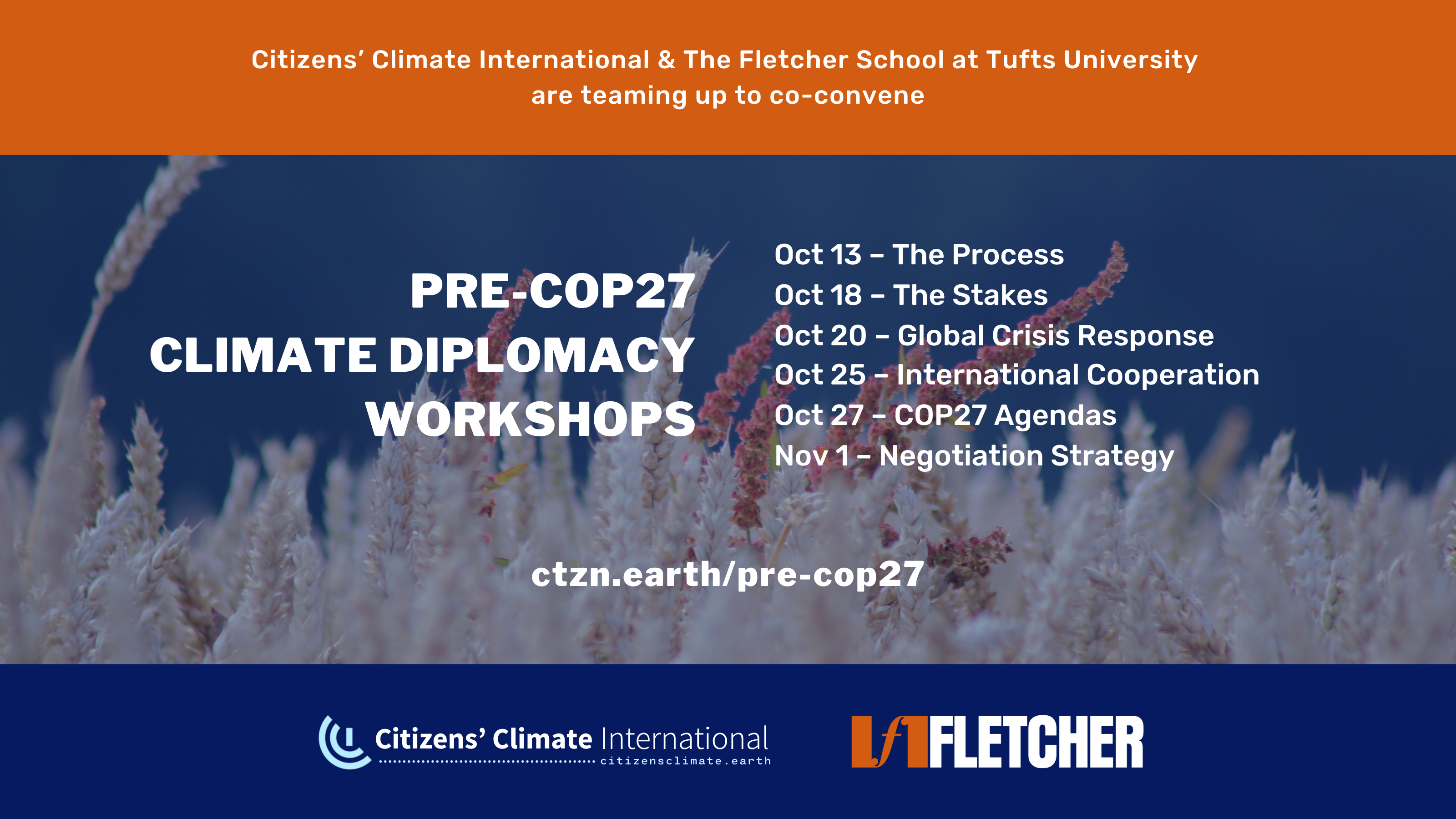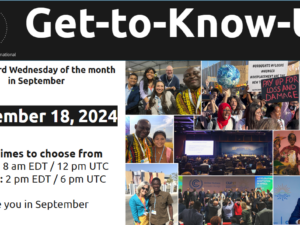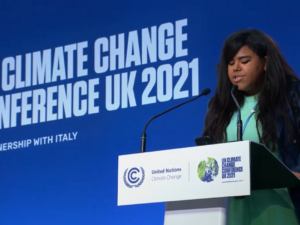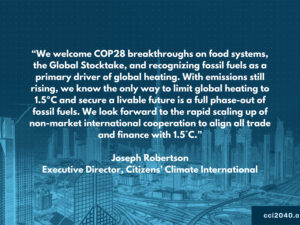
As the world moved toward the 2015 Paris Climate Agreement, it became evident nations were going to need to find a way to structurall transform incentives across their economies, and they would need a way to do this while innovating collaboratively. Our team was working, at the time, on a way to communicate the virtues of a people-centered approach to carbon pricing, that would allow nations to use the same language, think towards the same goals, and explore diverse suites of policies best suited to their needs and priorities.
That work led to the PARIS Principles for effective, efficient, equitable carbon pricing:
- Price pollution with a defined, steadily rising price on climate-disrupting emissions, preferably at the source.
- Add momentum. Enhance incomes; build economic value at the human scale.
- Reduce emissions effectively and accountably, by keeping the administrative structure simple and transparent.
- Internalize inefficiencies—cost and harm linked to polluting business models—incrementally, with escalating certainty and with no leakage.
- Spread by aligning price signals and supporting policies, harmonizing across borders, so pricing can be enacted country by country.
In other words, put a price on pollution to:
- Add good and reduce bad, while…
- Internalizing costs and spreading benefits.
High value investments should be those that do the most to reduce harm and increase shared health, resilience, and prosperity. Valuing activities that add value narrowly while destroying value for everyone else makes no practical or moral sense and is mathematically untenable.
- Climate costs are accumulating. The COVID-19 spillover pandemic is the most costly impact to date from environmentally destructive industrial development. Even without fully accounting for future spillover events, new analysis finds unchecked climate disruption will cost the world $178 trillion by the year 2070.
- The United Nations has formed a Global Crisis Response Group on Food, Energy, and Finance, because without comprehensive mainstream system transformation in those three sectors, much of the world will have no hope of stability, security, or prosperity.
- The risks of conflict are proliferating and compounding, and costs of living across the world are out of step with meager or non-existent wage increases.
We will need to develop innovative cooperative strategies for early warning, threat reduction, and climate resilient development, on a scale never before attempted, just to safeguard everyday wellbeing at the human scale. The Paris Agreement captured this need astutely in paragraph 8 of Article 6, which calls for:
“integrated, holistic and balanced non-market approaches being available to Parties to assist in the implementation of their nationally determined contributions, in the context of sustainable development and poverty eradication, in a coordinated and effective manner…”
Article 6.8 specifies that these non-market cooperative measures should address, among other goals and priorities:
- mitigation of global heating pollution and related climate risk;
- the need for adaptation to climate change effects;
- finance to support climate-smart planning, development, solutions, and transparent cooperation;
- sharing of knowledge and resources, including through technology transfer and capacity-building.
We take particular note of the fact that Article 6.8 also calls on countries to raise ambition by addressing mitigation and adaptation across a continuum of climate policy, while fostering both public and private sector participation in national efforts to mobilize climate solutions. This is why non-market approaches are intended to support, and be supported by, “coordination across instruments and relevant institutional arrangements.”
In other words: All areas of policy, investment, and practice, can play a role in reducing climate-related threats and increasing our chances of thriving in a climate-friendly way, and those that do should be rewarded for it. So, we want to look at non-market approaches in line with the PARIS Principles:
- Price pollution – Public and private sector actors can act independently or in concert to impose both implicit and explicit carbon prices. By dealing honestly with the costs of pollution, everyday economic incentives can be shifted to favor pollution-free methods and practices.
- Add momentum – Climate income provides households and local economies with a way to propser through the transition, making it easier to find low-emissions returns on investment. Other non-market approaches (including Special Drawing Rights, trade conditionalities, and climate-smart debt relief) can create fiscal space and add momentum.
- Reduce emissions – Pollution pricing will shift incentives away from pollution; backing up pricing policies with other non-market cooperative approaches can allow trading partners to amplify the opportunity for low-emissions investment. International cooperation should include measures to make low-emissions supply chains the mainstream norm.
- Internalize inefficiencies – Negative externalities should be reduced as much as possible, while polluters carry the costs of their pollution. Structural inefficiencies also need to be transformed, through climate-smart and nature-positive investments, financial instruments, and knowledge sharing.
- Spread by aligning – Fairplay border adjustments can prevent pollution offshoring; trade negotiations, financial regulations, sharing of data, and climate-aligned sovereign debt management can make it easier to reward mitigation and adaptation actions and incentivize climate resilient development.
All of these things should be on the table in bilateral and multilateral discussions. Regional trade groupings and global alliances can be built around non-market approaches to climate resilient development. Banking sector transparency, local job creation, and rural diversification and redevelopment, in line with nature, climate, and sustainability goals, can all be direct benefits of taking the most ambitious view of what Article 6.8 activities can be.
Because they involve more than one country, can involve public and private sector actors, and are intended to advance protection of nature, sustainable development, and poverty eradication, Article 6.8 non-market approaches implicitly hold the promise to operate between scales of action and influence. Powerful nations and wealthy financial institutions can be part of the same collaboration that benefits smallholder farmers and vulnerable countries and communities.
This multidimensional, multiscale dynamic means it should be easier to align macroeconomic incentives, financial sector practice and priorities, and everyday consumer need and choice, with climate-secure food systems. It should be easier to make the sharing of resources to increase (instead of depleting) global public goods a priority in international talks.
The COP27 can be a moment where the following threads come together, to make this accelerated, better-resourced climate action possible:
- Change incentives, including through carbon fees and climate income policies, to remove incentives that drive pollution.
- Align trade, finance, and debt standards and preferred practices, with climate and sustainability goals.
- Connect financial performance metrics to Earth systems data, to reward nature-positive practices directly.
- Prioritize and reward trade and development that foster climate-secure food systems for everyone.
- Share knowledge and techology to mainstream early warning, threat reduction, rapid crisis response, and resilience, everywhere.
We are living through a moment of interconnected crisis. It can be a moment of hope and promise, if we use all of the tools now available to drive change quickly.
Citizens’ Climate International and The Fletcher School at Tufts University are teaming up to co-convene a series of Pre-COP27 Climate Diplomacy Workshops. Through six free virtual 90-minute sessions, participants will hear from experienced participants in the UNFCCC process, as well as from leaders in climate diplomacy scholarship, advocacy, and multidisciplinary study.
The six sessions will run as follows:
- Thu, Oct 13 – The Process: History, structure, and overview
- Tue, Oct 18 – The Stakes: Science and human-scale impact
- Thu, Oct 20 – Global Crisis Response: Aligning emergency measures with long-term sustainability and resilience imperatives
- Tue, Oct 25 – International cooperation to create fiscal space for climate action
- Thu, Oct 27 – The COP27 Agendas
- Tue, Nov 1 – Navigating Complexity: The multidisciplinary approach and negotiation for mutual gains
Additional resources
- UNFCCC Cooperative Implementation (Article 6 of the Paris Agreement) process tracking homepage
- CCI / Resilience Intel brief on Article 6.8 non-market approaches (June 2022)
- Financial integration and inclusion needed to get best results from Glasgow outcomes
- Bonn climate talks signal need for good food finance
- Article 6.8 of the Paris Agreement can be an engine for food security
- CCL UK: Carbon pricing and the cost of living crisis (Sept 2022)
- Climate Income: People centered carbon pricing is a shortcut to a better future
- A carbon club of nations is necessary to achieve climate resilience
- CBAM: Background on the European Union’s coming Carbon Border Adjustment Mechanism
- Resilience Intel report on the Inflation Reduction Act: Creating fiscal space for climate action









